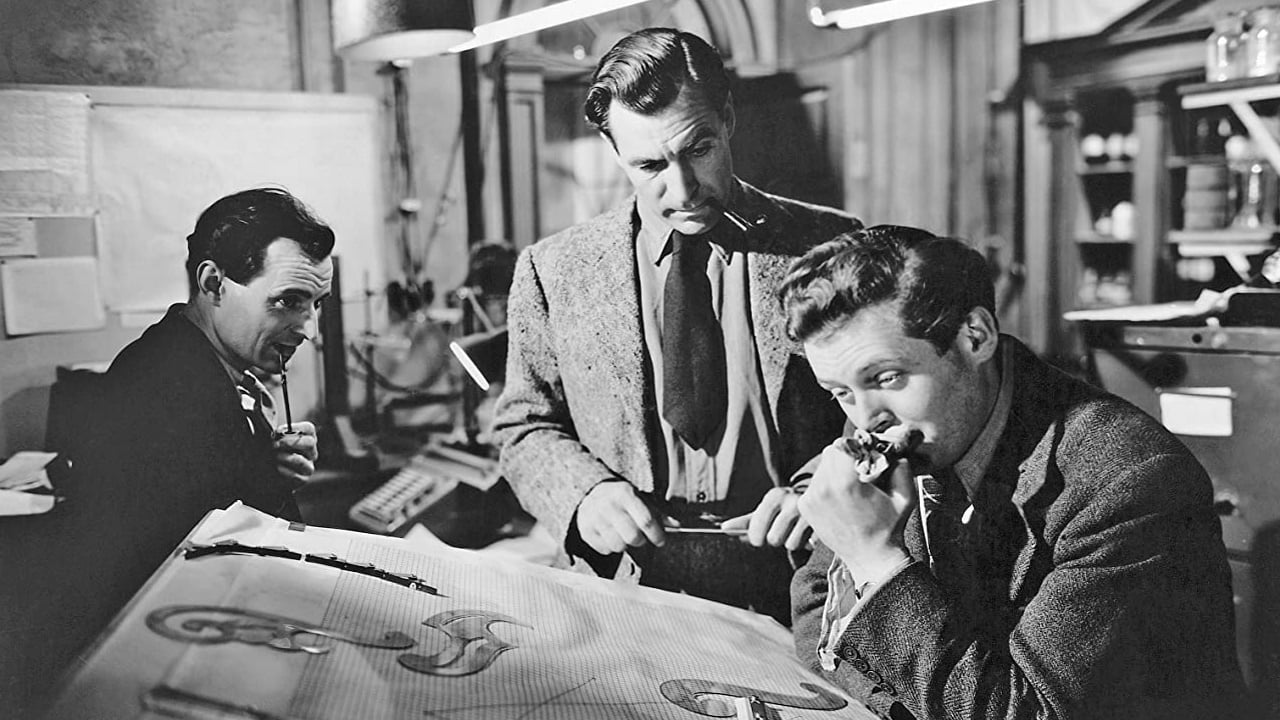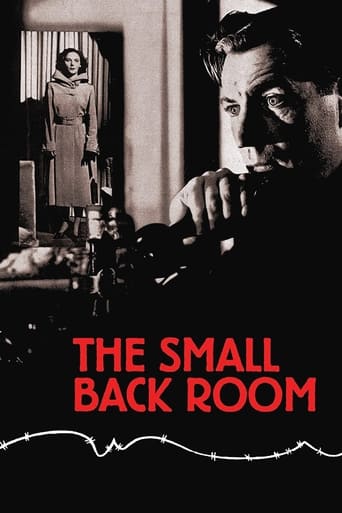

Based on the 1943 novel of the same name by Nigel Balchin, this is an absorbing, if at times very depressing, character drama. As I have come to expect from Powell and Pressburger's films, the duo's writing and direction is excellent. Both are very effective in communicating the struggles that a person goes through while dealing with alcoholism and depression and the negative effect that they can have on relationships. This is certainly helped by the moody, atmospheric cinematography of Christopher Callis. I loved the interaction of light and shadow throughout the film. When it comes to the treatment of the World War II material, the wonderful bomb disposal scene towards the end of the film is the most tense scene of its kind that I have ever seen. In contrast to the duo's earlier films, this was a bit of a flop at the box office. Powell attributed this in part to its extremely gloomy tone, which he did not think sat well with postwar British audiences.The film stars the sorely underrated David Farrar in a first rate performance as a military scientist named Sammy Rice, who is assigned to a "back room" think tank in London which is run by his friend and mentor Professor Mair. Sammy is a bitter, morose man who has a low opinion of most things in life, including himself. He has an artificial foot which is extremely painful but which he refuses to take off while in the company of other people, even his girlfriend Susan. The doctors have naturally given him painkillers but he finds them largely ineffective. He has instead turned to the "noble remedy" of alcohol, which is not much better when it comes to dulling the pain. However, it is effective in dulling his other senses, at least for a few hours at a time. There is a sense that Sammy is merely going through the motions when it comes to his life and, if there had not been a war on, he would probably do nothing more than shut himself away and drink. He is severely depressed, something which is not helped by his heavy drinking, and these feelings have manifested themselves in the form of self-pity. While Susan is more loyal and supportive more than most people would be in those circumstances, she eventually has enough of Sammy's attitude and the fact that he is neglecting her. She tells him that losing his foot means that he can't be a professional footballer but it does not mean that his life is over as he still has a great deal to live for. It becomes clear to Susan that he has no ambition to better himself and she breaks up with him. This sends him on a downward spiral. His drinking becomes even more pronounced and he starts a fight in a bar but is thrown out before it can escalate any further. He even cracks open the bottle of whiskey that he and Susan had been saving for V-E Day. This is followed by an excellent fantasy sequence in which Sammy is almost crushed against a wall by a giant bottle. This symbolism is not exactly subtle but it is extremely effective. The fact that the beginning of the fantasy sequence is accompanied by an extremely loud ticking sound is representative of Sammy's realisation that he is wasting his life. After this, he manages to sober up and begins to get his life back together. The role of Susan could have been a rather thankless one but Kathleen Byron delivers an extremely good performance, her best moment being the breakup scene, and the character always seems like a real person.In one of his first film appearances, Michael Gough is very strong as Captain Stuart, a young officer who comes to Sammy in the hope that he can help figure out the workings of small booby traps which the Germans have recently begun dropping on Britain during raids. This investigation of the booby traps, disguised as thermos flasks, forms a major backdrop to Sammy's struggles with alcoholism and is ultimately one of the reasons that he is able to overcome it. Jack Hawkins is excellent as the think tank's smarmy, sleazy, obnoxious and condescending administrator R.B. Waring, whom both Sammy and Susan feel like punching at different points during the film. I admire their restraint. In a small but uncharacteristically serious role, Sid James is great as the sympathetic bartender Knucksie Moran. The same is true of Cyril Cusack as Corporal Taylor, who is trying to save his deteriorating marriage. Robert Morley, credited as "A Guest," has a fantastic cameo as the incredibly dimwitted Minister in one of the film's only light-hearted moments. The film also features nice appearances from Geoffrey Keen as the civil servant Pinker (who is a bit of a stinker), Michael Goodliffe as Till, Renée Asherson as an A.T.S. corporal, Walter Fitzgerald as Professor Brine, Anthony Bushell as Colonel Strang and, in one of his final film appearances before his death in 1952, Leslie Banks as Colonel Holland.Overall, this is an excellent film, even if it isn't on the same level as the Archers' best work.
... View MoreWhile not a great film in comparison to other Archer productions such as The Life and Death of Colonel Blimp, 49th Parallel or The Red Shoes, The Small Back Room is a tense and interesting British thriller that recounts what it must have felt like to live in England during World War II, a most precarious time when the threat of Nazi air invasion was constantly hanging overhead (no pun intended).In this story, David Farrar and Kathleen Byron are reunited after their tumultuous chemistry in Black Narcissus, playing a respected bomb detector and his secretary girlfriend who find themselves fighting a personal war in addition to the larger conflict amidst Europe. Farrar finds himself battling alcoholism and directors Michael Powell and Emeric Pressburger create many parallels between the two instances. What is most intriguing about this film, like so many other Powell and Pressburger productions, is how the ideas are presented as just as important as the action. Most American films, particularly in the last three decades, seem to focus solely on the actions of the characters rather than the notions that lead to such activity. Here, there is constant stewing over how to effectively dismantle and recognize Nazi booby-traps, all leading up to a rather tense and dramatic conclusion in which the embittered protagonist must fight his inner demons to save the day.The plot for the most part is rather trivial. What is important, and what remains, is the fact that Britain put itself entirely on the line to save Europe and possibly the world from what was perceived as pure evil. Films like this, 49th Parallel, and Colonel Blimp were often received as war propaganda used to encourage the British public to support the war effort. Even after the war, such films were quite useful in keeping up the morale in tough times that would eventually culminate in the Cold War. To see such a film today is to understand better a small aspect of history previously unavailable.
... View MoreAs I am sometimes less than kind in my comments of the Archers, it was a pleasure to rediscover the other day "The Small Back Room" , a film I had not seen since its original release. Although this is generally regarded as one of their minor works, presumably because of its lack of flamboyance, it takes for once a very serious theme and treats it in a thoroughly mature way; that of the psychologically flawed individual and how he reacts when faced with possibly the greatest challenge in his professional career. Two of Sidney Lumet's finest films, "Equus" and "The Verdict" have the same subject. Sammy Rice, the boffin of "The Small Back Room", is struggling with alcoholism and the mental as well as the physical pain of coping with an artificial foot when he is called upon to discover the way to dismantle one of several booby-trap explosive devices dropped by the Germans over Britain in 1943. The casting of the two central characters is perfect. Although the part of Sammy calls for someone with a James Mason like authority, a much lesser actor, David Farrar, rises to the occasion particularly as he has the advantage of a large lumbering frame that conveys a certain physical awkwardness. As his sympathetic ladyfriend, Susan, Kathleen Byron drops her "Black Narcissus" melodramatics to give the performance of her lifetime as the woman who really knows how to handle Sammy when he is at his lowest. Add to this the fine camerawork of Christopther Challis, particularly liberal in its use of huge closeups that significantly heighten the psychological tension of the narrative, and you have a film well worthy of attention. In only two scenes does it falter. Unfortunately by conforming to the tiresome custom of British films of the period of sending up the Establishment, it presents Robert Morley as a rather silly senior minister. Although this would have probably fitted in the context of a comedy it is out of place in a film as darkly toned as this. Then there is the melodramatic lapse of resorting to Teutonic Expressionism when Sammy is fighting his alcoholism. In this nightmarish sequence he is physically dwarfed by a giant whisky bottle and an alarm clock. This is one of only two scenes to use background music. For the rest, untypically for this period, it does without. It makes for a stronger, more hard-edged experience.
... View MoreThis is a wonderful movie, ahead of its time. The filming has the intense chiaroscuro of monochrome at its best, Kathleen Byron is astonishingly beautiful (even more so than in Black Narcissus), and the undertones are dark and very modern. Susan and Sam (the pain-ridden hero) have no idealised relationship; the film is uncompromising about Sam's alcoholism and, remarkably for its time, clear in its implication that Sue and Sam live together despite being unmarried. There are also many nice well-observed details, such as the scientist who embarrasses a visiting minister by knowing the answer to a sum faster than the calculator they are supposed to be demonstrating, the snoozing officer in the War Room, and the laid-back Strang who clearly is intensely attracted to Sam. I just keep watching this and finding more to see.
... View More